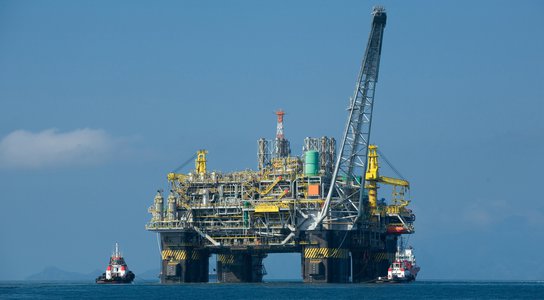- UK Government financing for fossil fuel projects abroad runs into the billions of pounds
- Fossil fuel financing undermines government aid objectives, locks in fossil fuel economies in the global south, crowds out renewable exports and harms the UK's international reputation.
- Renewable energy is the best way to get energy access for the world's poorest people and to promote an export industry at home
The UK Government’s claims of climate leadership at home and its commitment under the Paris Climate Agreement to align international public finance with climate-resilient development run counter to the vast scale of the UK’s support for fossil fuel projects abroad.
Despite some climate progress at home, the UK’s overseas fossil fuel support remains largely unreformed and ignored. It runs into billions of pounds, reaches every corner of the world, exacerbates climate change, locks developing countries into high-carbon trajectories, and harms the UK’s own international development and climate goals.
The COVID-19 crisis means that we need a green recovery. But crucially, this can’t just be a green recovery within the UK’s borders, because climate change does not stop at borders. We need a green recovery that applies to all the UK’s overseas public finance, one that takes note of the fact that we must export green technology, not fossil fuels.
The scale of the problem
UK support for fossil fuels overseas splits between ODA (Official Development Assistance – aid money) and non-ODA sources. The scale is huge:
- CAFOD /ODI research shows that the UK spent £4.6 billion on fossil fuels overseas between 2010-17, comprising both ODA and non-ODA support across a range of departments. Although Government opacity makes it difficult to arrive at uniform figures, the CAFOD / ODI data should be taken as a bare minimum.
- UK Export Finance, a Government agency tasked with assisting business abroad, gave 97% of their energy support from 2010-17 to fossil fuel projects. A study of their latest annual report suggested they gave £2 billion to fossil fuels in 2017/18 alone, an elevenfold increase of fossil fuel support. This includes export support to Saudi Aramco, fracking in Argentina, and support for a Bahraini oil refinery the week after the IPCCs 1.5c report.
- The Prosperity Fund, an ODA fund administered by the Foreign Office, was exposed in 2018 for financing two projects in China to ‘promote UK expertise in fracking,’ as well as spending money on 14 more oil and gas extraction projects (for a total of £2 million in ODA) between 2016 and 2018.
- A February 2020 Global Witness report shows how the Private Infrastructure Development Group (PIDG), an investment organisation part-funded by the UK Government, spent $750 million on fossil fuel projects in the developing world from 2002-18.
Although the above figures are colossal, the true figure is likely far higher. For example, direct energy lending by the CDC Group, the development finance institution wholly owned by DFID, com is included in the CAFOD / ODI research, adding up to hundreds of millions invested in fossil fuels abroad. However, CDC’s total fossil fuel support is likely far higher than this, due to their intermediated energy investments via third parties. There is no transparent reporting on these investments but press reports and company reports suggest these could run into the billions.
In addition to ODA and non-ODA support, other forms of UK overseas fossil fuel support, the UK is a major shareholder in many multilateral development banks (MDBs) such as the World Bank, the Asia Infrastructure Investment Bank, the European Bank for Reconstruction & Development and many more. Fossil fuel projects are authorised and funded via these banks, which represents additional overseas fossil fuel support by the UK taxpayer.
In contrast, the UK spent only 5% of its overall support for energy on access for poor groups (12% of ODA) in the same period, 2010-17, against a backdrop where only 1% of global electricity finance goes to the DRE solutions needed by energy poor people and even less to clean cooking solutions.
In addition to this, the UK Government’s own independent advisers, the Committee on Climate Change, stated in their landmark May 2019 report on Net Zero that the UK’s ‘export finance is not aligned with climate goals, and often supports high-carbon investments.’ They have not analysed fossil fuels in ODA but would likely reach the same conclusion on that.
The ask
The UK Government must immediately end all overseas fossil fuel support, and transfer this support to zero-carbon energy development. It is completely feasible for the UK to end this support. There is no climate, energy poverty or development reason to continue funding fossil fuels.
This fossil fuel support runs counter to article 2.1(c) of the Paris Agreement (that financial flows must align with ‘low greenhouse gas emissions and climate-resilient development’), which the Government claims to support. Theresa May previously said that ODA needs to ‘support the transition to lower greenhouse gas emissions,’ but it is not clear what this means.
The UK is lagging behind. The European Investment Bank, the world’s largest public bank, has announced it will end all its fossil fuel support within two years. BPIFrance, the French export credit agency, will end coal support soon and will restrict oil and gas. Many other countries are examining their overseas support. In the UK, an inquiry by the Environmental Audit Committee called for an end to UK Export Finance fossil fuel support by 2021, a call echoed by Ban Ki-Moon. The International Development Select Committee have noted how fossil fuel support undermines UK aid goals.
Potential impact
The International Energy Agency noted in 2018 that ‘energy investment is increasingly underpinned by governments.’ That means that public finance plays a key role in funding fossil fuels. The UK is a major world player in providing this planet-killing finance. By cutting off the financial flows to fossil fuels, we can not only disrupt fossil fuel projects, but also create a domino effect where other states have to follow the UK.
For example, if UK ODA money to fossil fuels ended, it would embolden campaigners in other countries and would make it far harder for other countries to justify continuing to fund fossil fuels. If UK Export Finance - the world’s first export credit agency – ended fossil fuel support, other export credit agencies would follow.
The UK can’t be a climate leader without ending overseas fossil fuel support.
You might also like
-
Article In Aid of Who?
While the UK government claims to be a ‘climate leader,’ we reveal how a little-known investment group funded by the UK taxpayer has committed over $750 million to fossil fuel projects in some of the world’s poorest countries
-
Blog post Funding Fossil Fuels Overseas is Not Climate Leadership
BBC Newsnight report shines important light on UK funding fossil fuels abroad
-
Blog post Big oil is set to spend $5 trillion on fossil fuels we can’t afford to burn
Oil and gas companies are forecast to spend $4.9tn, all of which is incompatible with reaching Paris climate goals.